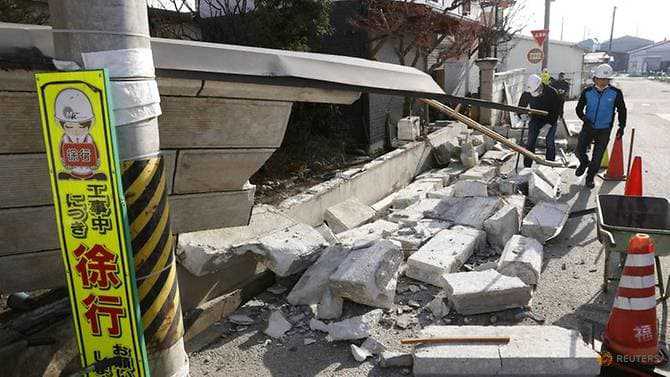Japan quake delivers rear memories of deadly 2011 tsunami
14 February, 2021

The stench of alcohol filled the tiny bar on Sunday (Feb 14) as Aoi Hoshino embroiled glass from whiskey bottles smashed in a solid earthquake the night time before, one appearing to be an aftershock from a devastating quake that hit the Fukushima area in 2011.
The 7.3-magnitude quake struck shortly before midnight over Saturday and cracked walls, shattered windows and tripped a landslide on Fukushima, the region closest to the epicentre. More than 100 persons were injured.
Hoshino, 46, swept broken glass from about 20 shattered whiskey bottles right into a bin handbag in her bar on a good back street in metropolis of Iwaki, roughly 200km north of Tokyo rather than far from the quake's epicentre.
"We were strike by this coronavirus pandemic, therefore we were getting excited about reopening our shops, and today this happens," she explained, referring to a locally-declared talk about of crisis that had shut her bar from January and was collection to lift on Mon.
"It’s just one thing after another."
The Japan Meteorological Organization said the quake was thought to be an aftershock from the magnitude 9.0 quake on Mar 11, 2011 that set off a tsunami, killing nearly 20,000 persons along a broad swathe of northeastern Japan, and the Fukushima nuclear accident, the world's most severe in 25 years. The firm warned of aftershocks for many days.
Hoshino said Saturday's quake cut back frightening memories.
"My own body immediately reacted, and I couldn’t end trembling. My legs had been shaking too, but I couldn’t gauge whether it was safer to perform out or stay in, so I finished up performing a weird little dance," she stated with a chuckle.
At least 121 persons were injured, NHK nationwide television said, including more than a few who suffered fractures, but there have been no reported deaths.
BUILDINGS SHOOK IN TOKYO
The 11.08pm native quake shook buildings in japan capital Tokyo, cutting capacity to thousands of properties across eastern and northeastern Japan. By morning hours, though, power was restored to virtually all.
Several thousand households remained without water, forcing residents lined up with plastic material jugs to get water from trucks.
Though a lot of Iwaki appeared as usual, tiles had fallen from the front of at least one building, and the sound of destroyed glass being swept up echoed from countless shops and restaurants.
On the wall of Noboru Endo's beauty salon a hairline crack had opened up, in the same place a wider one opened 10 years ago, but otherwise there was little damage.
Endo, 64, said Saturday's quake didn't review to the 2011 quake, which went on for several minutes and had aftershocks that lasted weeks.
"We’ve all pretty much gone back to lifestyle as usual, save a good few areas that are still badly affected," he explained of reconstruction efforts found in the area.
There is no tsunami, and no reports of irregularities at any nuclear plants. NHK reported that about 160mls (5 ounces) of drinking water acquired leaked from a put in fuel pool area at the Fukushima Dai-Ni reactor but that presented no danger.
Shinkansen bullet train services to much of northern Japan was suspended because of affect along the tracks. Service along one range was not likely to be restored until at least Tuesday.
Beermakers such as Asahi Group Holdings and Kirin Holdings, that have factories in Fukushima and Sendai, said they were assessing the impact on their conveniences. Kirin explained its Sendai plant sustained light damage and it was still checking the problem.
The power outages did not affect the Pfizer COVID-19 vaccines that arrived on Friday for inoculations that are to start out this week, Chief Cabinet Secretary Katsunobu Kato told a Sunday morning hours news conference.
Earthquakes are normal in Japan, among the world's most seismically dynamic areas, and Japan accounts for about 20 per cent of the world's earthquakes of magnitude 6 or greater.
Source:
TAG(s):
